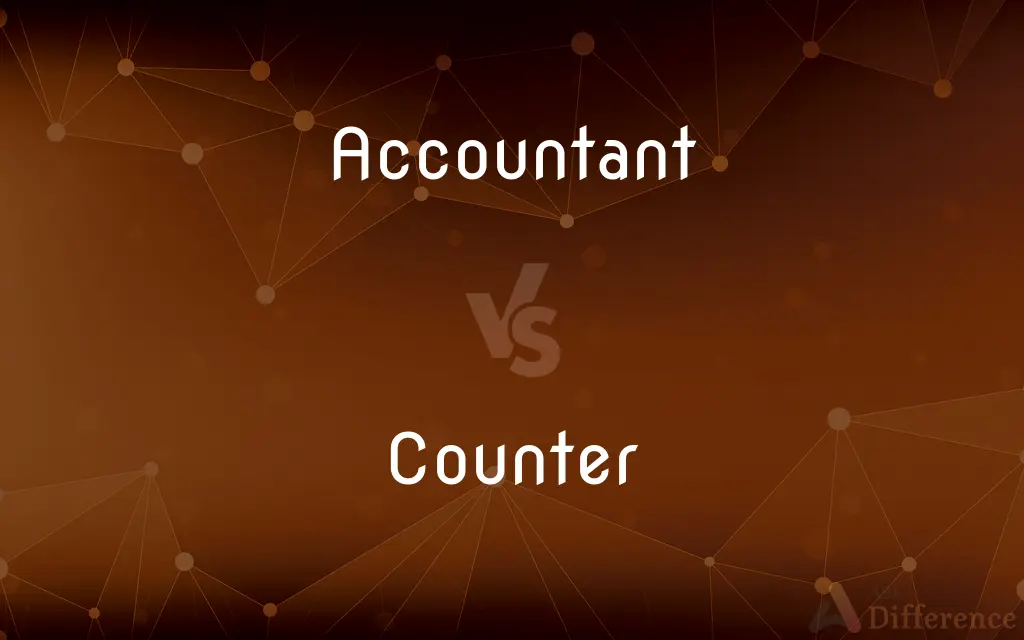Accountant vs. Counter — What's the Difference?
By Tayyaba Rehman & Maham Liaqat — Updated on March 17, 2024
An accountant manages financial accounts, ensuring accuracy and compliance with laws, whereas a counter typically refers to a physical surface or a person tallying quantities.

Difference Between Accountant and Counter
Table of Contents
ADVERTISEMENT
Key Differences
An accountant is a professional who handles financial records, prepares reports, and ensures compliance with legal requirements, aiming to provide a clear financial picture of a business or individual. On the other hand, a counter can refer to a flat surface used for transactions in stores or kitchens, or it might denote a person or device that counts items, emphasizing a more physical or quantitative role.
While accountants focus on analyzing financial transactions, preparing balance sheets, and offering advice on financial health, a counter, when understood as a person, is involved in enumerating objects, people, or actions, often for inventory, attendance, or measurement purposes, highlighting a distinction between financial management and quantitative assessment.
Accountants require formal education and certification, such as a CPA (Certified Public Accountant), to validate their expertise in accounting principles, taxation laws, and financial reporting. Whereas a counter, in the context of a job role, typically does not require such specialized education, focusing instead on accuracy and the ability to tally effectively.
In terms of tools and technology, accountants utilize software for bookkeeping, tax preparation, and financial analysis, leveraging technology to enhance accuracy and efficiency in financial management. Conversely, counters may use simple tools like tally counters or more advanced digital counting devices, underscoring the difference in technological needs between managing finances and counting.
Accountants play a critical role in strategic planning by analyzing financial data to inform business decisions, while a counter, especially in the context of inventory or attendance, provides essential data that can impact operational strategies, illustrating how both roles contribute differently to organizational success.
ADVERTISEMENT
Comparison Chart
Finition
Professional managing financial records and ensuring compliance.
Flat surface for transactions or person/device tallying items.
Primary Role
Financial management, reporting, and advising.
Counting and enumerating items or transactions.
Required Education
Formal education and certification (e.g., CPA).
Generally requires no specialized education.
Tools/Technology
Accounting software for bookkeeping, tax preparation.
Tally counters, digital counting devices.
Contribution to Org
Strategic financial planning and analysis.
Operational support through accurate counting.
Compare with Definitions
Accountant
A professional skilled in managing and analyzing financial records.
The accountant prepared the annual financial statements.
Counter
A flat surface for conducting business transactions.
The cashier used the counter to finalize the sale.
Accountant
Offers advice on financial planning and investments.
The accountant suggested diversifying our investment portfolio.
Counter
A device used for tallying items or actions.
The surveyor used a counter to track the number of passing cars.
Accountant
Expert in tax law and preparation of tax returns.
The accountant optimized our tax strategy to save money.
Counter
A job role focused on counting stock or inventory.
The counter was responsible for the year-end inventory check.
Accountant
Manages day-to-day financial transactions and record-keeping.
The accountant updated our books with the latest transactions.
Counter
A person engaged in the act of counting.
The counter tallied the attendees at the event.
Accountant
Conducts audits to verify the accuracy of financial records.
The accountant found discrepancies during the audit.
Counter
A work surface in kitchens for preparing food.
The chef chopped vegetables on the kitchen counter.
Accountant
An accountant is a practitioner of accounting or accountancy. Accountants who have demonstrated competency through their professional associations' certification exams are certified to use titles such as Chartered Accountant, Chartered Certified Accountant or Certified Public Accountant, or Registered Public Accountant.
Counter
A flat surface on which money is counted, business is transacted, or food is prepared or served.
Accountant
One that keeps, audits, and inspects the financial records of individuals or business concerns and prepares financial and tax reports.
Counter
(Games)A piece, as of wood or ivory, used for keeping a count or a place.
Accountant
One who renders account; one accountable.
Counter
An imitation coin; a token.
Accountant
A reckoner, or someone who maintains financial matters for a person(s).
Counter
A piece of money.
Accountant
(accounting) One who is skilled in, keeps, or adjusts, accounts; an officer in a public office, who has charge of the accounts.
Counter
One who counts.
He's only 16 months, but is already a good counter – he can count to 100.
Accountant
(accounting) One whose profession includes organizing, maintaining and auditing the records of another. The records are usually, but not always, financial records.
Counter
A reckoner; someone who collects data by counting; an enumerator.
Accountant
(obsolete) Accountable.
Counter
An object (now especially a small disc) used in counting or keeping count, or as a marker in games, etc.
He rolled a six on the dice, so moved his counter forward six spaces.
Accountant
One who renders account; one accountable.
Counter
A telltale; a contrivance attached to an engine, printing press, or other machine, for the purpose of counting the revolutions or the pulsations.
Accountant
A reckoner.
Counter
(programming) A variable, memory location, etc. whose contents are incremented to keep a count.
Accountant
One who is skilled in, keeps, or adjusts, accounts; an officer in a public office, who has charge of the accounts.
Counter
(Internet) A hit counter.
Accountant
Accountable.
Counter
A table or board on which money is counted and over which business is transacted
He put his money on the counter, and the shopkeeper put it in the till.
Accountant
Someone who maintains and audits business accounts
Counter
A shop tabletop on which goods are examined, weighed or measured.
Counter
In a kitchen, a surface, often built into the wall and above a cabinet, designed to be used for food preparation.
Counter
In a bathroom, a surface, often built into the wall and above a cabinet, which holds the washbasin.
Counter
(curling) Any stone lying closer to the center than any of the opponent's stones.
Counter
(historical) The prison attached to a city court; a compter.
Counter
(grammar) A class of word used along with numbers to count objects and events, typically mass nouns. Although rare and optional in English (e.g. "20 head of cattle"), they are numerous and required in Chinese, Japanese, and Korean.
Counter
Something opposite or contrary to something else.
Counter
(martial arts) A proactive defensive hold or move in reaction to a hold or move by one's opponent.
Always know a counter to any hold you try against your opponent.
Counter
(nautical) The overhanging stern of a vessel above the waterline, below and somewhat forward of the stern proper.
Counter
The piece of a shoe or a boot around the heel of the foot (above the heel of the shoe/boot).
Counter
(music) contra Formerly used to designate any under part which served for contrast to a principal part, but now used as equivalent to countertenor.
Counter
(typography) The enclosed or partly closed negative space of a glyph.
Counter
(obsolete) An encounter.
Counter
Contrary, in opposition; in an opposite direction.
Counter
In the wrong way; contrary to the right course.
A hound that runs counter
Counter
To contradict, oppose.
Counter
(boxing) To return a blow while receiving one, as in boxing.
Counter
To take action in response to; to respond.
Counter
To encounter.
Counter
Contrary or opposing
His carrying a knife was counter to my plan.
Counter
One who counts, or reckons up; a calculator; a reckoner.
Counter
A piece of metal, ivory, wood, or bone, used in reckoning, in keeping account of games, etc.
The old gods of our own race whose names . . . serve as counters reckon the days of the week.
What comes the wool to? . . . I can not do it without counters.
Counter
Money; coin; - used in contempt.
To lock such rascal counters from his friends.
Counter
A prison; either of two prisons formerly in London.
Anne Aysavugh . . . imprisoned in the Counter.
Counter
A telltale; a contrivance attached to an engine, printing press, or other machine, for the purpose of counting the revolutions or the pulsations.
Counter
A table or board on which money is counted and over which business is transacted; a long, narrow table or bench, on which goods are laid for examination by purchasers, or on which they are weighed or measured.
Counter
The after part of a vessel's body, from the water line to the stern, - below and somewhat forward of the stern proper.
Counter
Same as Contra. Formerly used to designate any under part which served for contrast to a principal part, but now used as equivalent to counter tenor.
Counter
The back leather or heel part of a boot.
Counter
An encounter.
With kindly counter under mimic shade.
Counter
Contrary; in opposition; in an opposite direction; contrariwise; - used chiefly with run or go.
Running counter to all the rules of virtue.
Counter
In the wrong way; contrary to the right course; as, a hound that runs counter.
This is counter, you false Danish dogs!
Counter
At or against the front or face.
Which [darts] they never throw counter, but at the back of the flier.
Counter
Contrary; opposite; contrasted; opposed; adverse; antagonistic; as, a counter current; a counter revolution; a counter poison; a counter agent; counter fugue.
Counter
To return a blow while receiving one, as in boxing.
His left hand countered provokingly.
Counter
Table consisting of a horizontal surface over which business is transacted
Counter
Game equipment used in various card or board games
Counter
A calculator that keeps a record of the number of times something happens
Counter
A piece of furniture that stands at the side of a dining room; has shelves and drawers
Counter
A person who counts things
Counter
A quick reply to a question or remark (especially a witty or critical one);
It brought a sharp rejoinder from the teacher
Counter
(computer science) a register whose contents go through a regular series of states (usually states indicating consecutive integers)
Counter
The piece of leather that fits the heel
Counter
A piece of leather forming the back of a shoe
Counter
A return punch (especially by a boxer)
Counter
Speak in response;
He countered with some very persuasive arguments
Counter
Act in advance of; deal with ahead of time
Counter
Indicating opposition or resistance
Counter
In the opposite direction;
Run counter
Common Curiosities
Do counters need specific skills?
Counters need to be accurate, able to tally quickly, and sometimes use counting devices, but no formal education is typically required.
What does an accountant do?
An accountant manages financial records, ensures legal compliance, and offers financial advice.
Can an accountant be a counter?
While an accountant primarily deals with finances, they may count transactions, but their role is much broader and specialized.
What education is required to be an accountant?
Accountants typically need a bachelor's degree in accounting or a related field, plus certifications like CPA for certain roles.
Can a counter be a machine?
Yes, counters can be mechanical or electronic devices used for tallying items or actions.
Can anyone be a counter?
While most people can perform basic counting tasks, certain contexts require specialized counting devices or techniques.
What legal requirements do accountants help with?
Accountants ensure financial practices comply with laws, including tax laws, financial reporting standards, and regulations.
What's the difference between a bookkeeper and an accountant?
Bookkeepers manage daily transactions, whereas accountants handle more complex financial reporting, analysis, and advice.
Why is accuracy important for both accountants and counters?
Accuracy is crucial to ensure financial records are correct for accountants and that counts are precise for counters.
What is a counter in retail?
In retail, a counter is a surface where transactions are made between customers and cashiers.
How does technology impact accountants and counters?
Accountants use software for efficient financial management, whereas counters may use digital devices for accurate tallying.
How does an accountant contribute to tax preparation?
Accountants prepare and file tax returns, ensuring compliance with tax laws and optimizing tax strategies.
Is financial planning part of an accountant's job?
Yes, accountants analyze financial data to aid in strategic financial planning and decision-making.
Why might a business hire an accountant over a bookkeeper?
A business might hire an accountant for in-depth financial analysis, strategic planning, and complex tax issues, beyond basic bookkeeping.
What roles might a counter have in a manufacturing setting?
In manufacturing, a counter might tally products, parts, or perform inventory checks.
Share Your Discovery

Previous Comparison
Defreeze vs. Defrost
Next Comparison
Connotation vs. DenotationAuthor Spotlight
Written by
Tayyaba RehmanTayyaba Rehman is a distinguished writer, currently serving as a primary contributor to askdifference.com. As a researcher in semantics and etymology, Tayyaba's passion for the complexity of languages and their distinctions has found a perfect home on the platform. Tayyaba delves into the intricacies of language, distinguishing between commonly confused words and phrases, thereby providing clarity for readers worldwide.
Co-written by
Maham Liaqat













































